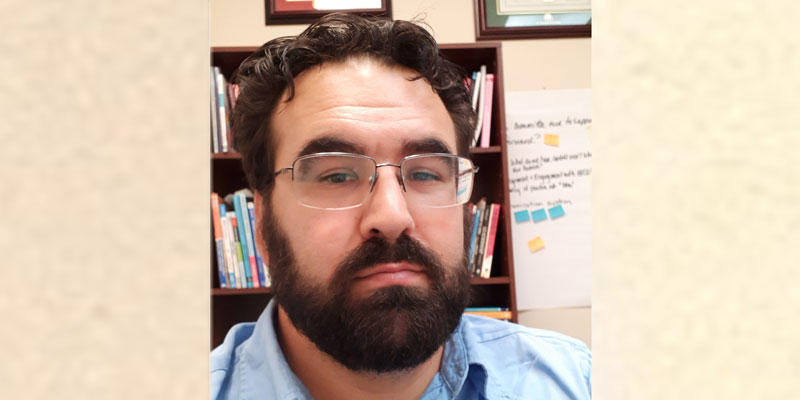Chris Ryan (BPhil’05, MEd’18) is working on integrating a model of community centered education in the NB public school system
Author: UNB Alumni
Posted on Feb 22, 2022
Category: UNB Fredericton , Inspiring Stories

Two-time alumnus and current UNB PhD student Chris Ryan (BPhil’05, MEd’18) spent thirteen years of his career inside the classroom as a New Brunswick teacher. So there is no better fit for this educational leader to help explore change in the province than through his recent appointment as research associate with the Mount Allison University Research Partnerships for Education and Community Engagement (R-PEACE) Group.
Awarded a three- year New Brunswick Innovation Foundation (NBIF) funding grant, Ryan and the R-PEACE group’s focus is looking at community engaged education. With support from his doctoral research at UNB, exploring what the next version of high school should look like in New Brunswick. Ryan’s work will examine other education models that exist in communities, provinces, and countries around the world.
“We have global competencies and this huge push in New Brunswick on experiential learning and personalized learning,” says Ryan. “I’m exploring all of these things in both my work with R-PEACE and my academic research. They’re feeding into each other, and vice versa.”
Since beginning his role in September of 2021, Ryan has been deeply engaged in an academic literature review and looks forward to beginning a case study approach to his formal research, to see what exciting things are happening within the province’s classrooms.
Ryan explains that although we now use technology like Zoom and Teams, the majority of schools around the world are still largely organized the way they were 50 years ago. Despite some change and movement, he says there are opportunities to think about how we can create fundamental change in our systems, even if that means doing things very differently.
“The catch phrase from people in industry is kind of - how do we modernize the education system to catch up with our economy - but I think it’s really more than that.”
“How do we update our education system, so that we have high functioning, globally literate citizens? How do we empower citizens to contribute to a strong democracy?"
In addition to his role with R-PEACE, Ryan also sits on the Southeast Labour Market Partnership (SLMP) as an education advisor, looking at how we can better organize our education sector and our industry sector to attract and to retain more youth talent. Through his work with R-PEACE, he has also become involved with an international research project examining the physical space of schools and how that layout changes the education paradigm.
While a student in Renaissance College’s third cohort, Ryan was faced with two career paths - to continue academic work in educational public policy, or to pursue a career as a teacher. Now that he has checked one job his list and has returned to his other passion for research, he says it’s been “the best of both worlds.”
“I know what a classroom looks like, how it works and how schools function, and now I’m on the research side of that as well. It’s nice to see some application of the theoretical stuff.”
Reflecting back on his time at Renaissance College, Ryan says that the leadership and interdisciplinary learning experiences taught at RC have been incredibly important skills in his life.
Ryan’s early student days of leading the college’s infamous ‘Soups On,’ certainly translated to the hands-on approach he’s taken throughout his career. Throughout his time teaching in Anglophone East, Ryan helped create three school-wide interdisciplinary projects for students, much like those he participated in at UNB.
“You try to build experiential learning into the classroom, but it’s hard to do that until you’ve had that experience yourself. RC opened my eyes to a different way that teaching and learning can happen. When you scratch the surface, you realize that RC did a really good job of not only explaining what leadership is but also giving students leadership activities.”
“To be able to integrate that into my own classroom practice, and into my work as a researcher helping to facilitate other educators, has been really cool.”